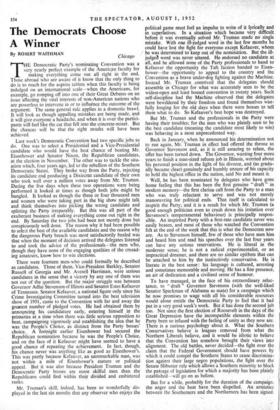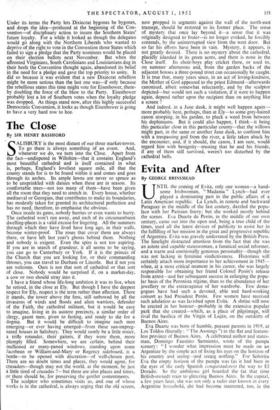The Democrats Choose A Winner
THE Democratic Party's nominating Convention was a very nearly perfect example of the American faculty for making everything come out all right in the end. Those abroad who are aware of it know that the only thing to do is to reach for the aspirin tablets when this faculty is being indulged on an international scale—when the Americans, for example, go romping off into one of their Great Debates on an issue affecting the vital interests of non-American nations who are powerless to intervene in or to influence the outcome of the argument. The same general rule applies in a domestic brawl. It will look as though appalling mistakes are being made, and it will give everyone a headache, and when it is over the partici- pants will feel like the cat that fell into the concrete-mixer. But the chances will be that the right results will have been achieved.
Last week's Democratic Convention had two specific jobs to do. One was to select a Presidential and a Vice-Presidential candidate who would have the best chance of beating Mr. Eisenhower and Senator Nixon, the Republican candidates, at the election in November. The other was to tackle the situ- ation which, four years ago, led to the rebellion of the Southern Democratic States. They broke way from the Party, rejecting its candidate and producing a Dixiecrat candidate of their own who took well over a million votes away from Mr. Truman. During the five days when these two operations were being performed it looked at times as though both jobs might be bungled. It looked as though the three or four thousand men and women who were taking part in the big show might talk and think themselves into picking the wrong candidate and splitting the Party irreparably. But this was all part of the exuberant business of making everything come out right in the end. By Saturday the two jobs had been not merely done but conspicuously well done. The reason why it had been possible to select the best of the available candidates and the reason why the dangerous Party breach was most satisfactorily healed was that when the moment of decision arrived the delegates listened to and took the advice of the professionals—the men who, though they have none of the engaging qualities of the crusad- ing amateurs, know how to win elections.
There were fourteen men• who could formally be described as candidates. Three of them, Vice-President Barkley, Senator Russell of Georgia and Mr. Averell Harriman, were serious candidates in the sense that a victory by any one of them was not out of the question. But the major struggle was between Governor Adlai Stevenson of Illinois and Senator Estes Kefauver of Tennessee. Senator Kefauver, a national figure only since his Crime Investigating Committee turned into the best television show of 1951, came to the Convention with far and away the greatest number of pledged votes. He had obtained them by announcing his candidature early, entering himself in the primaries at a time when there was little serious opposition to beat, campaigning vigorously and establishing the idea that he was the People's Choice, as distinct from the Party bosses' choice. A fortnight earlier Eisenhower had secured the Republican nomination because he was the People's Choice, and on the face of it Kefauver might have seemed to have a good chance of repeating the achievement. In fact, though, his chance never was anything like as good as Eisenhower's. This was partly because Kefauver, an unremarkable man, was not within a mile of Eisenhower's stature or political appeal. But it was also because President Truman and the Democratic Party bosses are more skilful men than_ the Republicans could find within their divided and embittered ranks.
Mr. Truman's skill, indeed, has been so wonderfully dis- played in the last six months that any observer who enjoys the political game must feel an impulse to write of it lyrically and in superlatives. In a situation which became very difficult before it was eventually solved Mr. Truman made no single mistake. With one ill judged word in the last few months he could have-lost the fight for everyone except Kefauver, whom be was determined to keep out of the nomination. But the ill- judges word was never uttered. He endorsed no candidate at all, and he allowed none of the Party professionals to hand to Kefauver the opportunity the Taft faction handed to Eisen- hower—the opportunity to appeal to the country and the Convention as a brave under-dog fighting against the Machine. Instead Mr. Truman contrived that the delegates should assemble in Chicago for what was accurately seen to be the widest-open and least bossed convention in twenty years. Such self-discipline had the Machine observed that the delegates were bewildered by their freedom and found themselves wist- fully longing for the old days when there were bosses to tell them what to do. So Kefauver's best hope was destroyed.
But Mr. Truman and the professionals in the Party were having their troubles; for the man who was plainly seen to be the best candidate (Meaning the candidate most likely to win) was behaving in a most unprecedented way..
Back in January, when he announced his determination not to run again, Mr. Truman in effect had offered the throne to Governor Stevenson and, as it is still amazing to relate, the offer has been turned down. The Governor, wanting four more years to finish a man-sized reform job in Illinois, worried about his personal position in the light of his divorce, and (as gradu- ally became clear) genuinely and humbly unsure of his capacity to hold the highest office in the nation, said No and meant it.
Well, -he has been nominated by delegates who have gone home feeling that this has been the first genuine " draft " in modern memory—the first clarion call from the Party to a man who was truly reluctant to serve and was not merely manoeuvring for political ends. That itself is calculated to inspirit the Party; and it is a result for which Mr. Truman (a good enough politician even to crush down his irritation over Stevenson's temperamental behaviour) is principally respon- sible. An inspirited Party with a first-rate candidate never was easily beaten, and most of those who watched the Convention felt at the end of the week that this is what the Democrats now are. As to Stevenson himself, few of those who have seen him and heard him and read his speeches over the last four years can have any serious reservations. He is liberal in the moderate sense; he is not a radical experimentalist, or an impractical dreamer, and there are no similar epithets that can be attached to him by the instinctively conservative. He is literate in the best sense : his language is cultured, arresting and sometimes memorable and moving. He has a fine presence, an air of dedication and a civilised sense of humour.
To have managed, in the face of his extraordinary reluc- tance, to " draft ' Governor Stevenson (with the well-liked Senator Spackman of Alabama as mate) for a campaign which he now promises to wage with all his considerable resources would alone entitle the Democratic Party to feel that it had put in a very good week's work. But it has done the second job too. Not since the first election of Roosevelt in the days of the Great Depression have the incompatible elements within the Party been so infused with the feeling of unity as they now are. There is a curious psychology about it. What the Southern Conservatives believe is leagues removed from what the Northern Liberals believe, and it would be idiotic to believe that the Convention has somehow brought their views into alignment. The old battles, never decided—the fight over the claim that the Federal 'Government should have powers by which it could compel the Southern States to cease discrimina- tion against their large negro populations, the fight over the Senate filibuster rule which allows a Southern minority to block the passage of legislation for which a majority has been plainly established—will go on as before.
But for a while, probably for the duration of the campaign, the anger and the heat have been dispelled. An armistice between the Southerners and the Northerners has been signed. Under its terms the Party lets Dixiecrat bygones be bygones, and drops the idea—produced at the beginning of the Con- vention—of disciplinary action to insure the Southern States' future loyalty. For a while it looked as though the delegates would ge along with the Northern Liberals who wanted to deprive of the right to vote in the Convention those States which failed to sign a pledge that the Party nominees would be placed on their election ballots next November. But when the affronted Virginians, South Carolinians and Louisianians dug in their heels the Convention thought again, abandoned its belief in the need for a pledge and gave the top priority to unity. It did so because it was evident that a new Dixiecrat rebellion might be more serious than the last one was—if only because the rebellious states this time might vote for Eisenhower, there- by doubling the force of the blow to the Party. Eisenhower probably lost a lot of Southern votes when the loyalty pledge was dropped. As things stand now, after this highly successful Democratic Convention, it looks as though Eisenhower is going to have a very hard row to hoe.



























 Previous page
Previous page